Denmark in the Eurovision Song Contest
Denmark has participated in the Eurovision Song Contest 48 times, making its first appearance in 1957. Having competed in ten consecutive contests until 1966, Denmark was absent for eleven consecutive contests from 1967 to 1977. Since 1978, it has been absent from only four contests. Denmark has won the contest three times: in 1963, 2000 and 2013. The Danish national selection for the contest is the Dansk Melodi Grand Prix.
| Denmark | |
|---|---|

| |
| Member station | DR |
| National selection events | National final
|
| Participation summary | |
| Appearances | 48 (44 finals) |
| First appearance | 1957 |
| Best result | 1st: 1963, 2000, 2013 |
| External links | |
| DR page | |
| Denmark's page at Eurovision.tv | |
Denmark in the Eurovision Song Contest 2021 | |
Denmark finished third on its debut in 1957 with Birthe Wilke and Gustav Winckler, before winning the contest for the first time in 1963 with the song "Dansevise" performed by Grethe & Jørgen Ingmann. The country returned to the top three 25 years later, with third-place finishes for Hot Eyes in 1988 and Birthe Kjær in 1989, while Denmark's only top five result of the 1990s was Aud Wilken's fifth place in 1995.
Denmark won the contest for the second time in 2000 with the Olsen Brothers and the song "Fly on the Wings of Love". Denmark then finished second as hosts in 2001 with "Never Ever Let You Go" performed by Rollo & King, before Malene Mortensen became the first Danish entry to finish last in 2002. Denmark won the contest for the third time in 2013, with Only Teardrops performed by Emmelie de Forest. Denmark has placed in the top five 14 times.
History
Denmark's debut
Denmark first participated at the Eurovision Song Contest 1957, held in Frankfurt, Germany. The country had intended to compete at the first contest in 1956, but had submitted its application past the deadline and was, therefore, not allowed to compete. Denmark was the first Nordic country to take part in the contest, with Sweden, Norway and Finland following soon after. Iceland, however, did not take part until 1986.
Denmark's first participants were Birthe Wilke and Gustav Winckler, who sang the song "Skibet skal sejle i nat" (English: The Ship Will Be Leaving Tonight). Their performance was controversial as, at the end of the song, the couple performed an 11-second kiss, which caused outcry in some countries. Nevertheless, the performance achieved third place.
First victory
Denmark won the contest for the first time in 1963, when Grethe and Jørgen Ingmann sang "Dansevise" (Dance Ballad). The victory, however, was controversial. When Norway announced its votes, the presenter Katie Boyle could not hear the spokesperson and said that she would call them again later. Viewers around Europe, however, did hear the Norwegian spokesperson, and when Boyle called the Norwegian spokesperson again, the votes had been changed, changing the outcome of the contest and giving the victory to Denmark at the expense of Switzerland. In fact, the reason why Norway had to announce its votes again was that the Norwegian spokesperson did not follow the right procedure the first time and, therefore, there was doubt whether he gave the correct votes on the first occasion.
The final result was valid and the victory went to Denmark. Accordingly, in 1964, the contest was held in Denmark for the first time.
Absence and return
After the 1966 contest and a record low 14th place, Denmark withdrew from the contest, as DR's new head of entertainment Niels Jørgen Kaiser did not view the contest as being quality entertainment. Dansk Melodi Grand Prix was not held from that year onwards.
However, in the 1978 contest, after 11 years' absence, and following Niels Jørgen Kaisers departure from DR, Denmark returned to the contest, represented by Mabel and the song "Boom Boom".
Success
Denmark's most successful time at the contest came between 1984 and 1990, with the country reaching the top eight in six out of seven contests, including four top-five placings. The duo of Hot Eyes represented the nation three times during this period. In 1984, they sang the song "Det' lige det" (That's Just It) and finished fourth. In 1985, they became the first and, as of 2020 only act to represent Denmark in two consecutive years. Singing "Sku' du spørg' fra no'en?" (What Business Is It Of Yours?), they could not repeat their success of the previous year and came 11th. In 1988, Hot Eyes represented Denmark again with "Ka' du se hva' jeg sa'?" (Didn't I Tell You So?). The duo scored its best result to date, finishing in third place, losing only to Céline Dion and Scott Fitzgerald. Denmark's other good results during this time were sixth place for Lise Haavik in 1986, fifth for Anne-Cathrine Herdorf & Bandjo in 1987, third for Birthe Kjaer in 1989 and eighth for Lonnie Devantier in 1990.
Denmark's fall
After 1990, Denmark fell from its high positions of the 1980s and was relegated from the contest on three occasions in the 1990s. In 1993, Tommy Seebach, who had previously represented Denmark in 1979 and 1981, finished 22nd, resulting Denmark being relegated from the contest in 1994. Aud Wilken sang "Fra Mols til Skagen" for the nation at the 1995 contest and came 5th, but this high placing could not be repeated in 1996, as Denmark's entry, "Kun med dig" sung by Dorthe Andersen and Martin Loft, did not qualify from the pre-qualifying round of the contest. In 1998, Denmark was once again relegated from the contest following a poor result in 1997.
Return to success in the 2000s
In 1999, the abolition of the language rule, which had required all countries to sing in their official languages, brought a return to success for Denmark, when Michael Teschl and Trine Jepsen finished 8th with "This Time I Mean It".
A year later, in 2000, Denmark would go on to win the contest again, with brothers Jørgen and Niels Olsen defying the odds (they were considerably older than their competitors and only one male duo had won before), to win with "Fly on the Wings of Love". The song went on to enjoy huge success around Europe.
At the 2001 contest, held in Copenhagen, Rollo & King came second with the song "Never Ever Let You Go". However, in 2002, despite being a favourite to win the contest, Malene Mortensen came 24th (last) with "Tell Me Who You Are", giving Denmark its worst result ever. Therefore, Denmark was relegated from the 2003 contest.
In 2005, Copenhagen hosted Congratulations: 50 Years of the Eurovision Song Contest, an event to commemorate the 50th anniversary.
Since the introduction of semifinals in 2004, Denmark has qualified for the final on eleven out of 15 occasions. Another string of successful participations started in 2010, when Denmark reached the top five for the first time in nine years, finishing fourth with "In a Moment Like This" performed by Chanée and n'evergreen. A year later, Denmark finished fifth with "New Tomorrow" performed by the band A Friend In London, and in 2013, Denmark won the contest for the third time, when Emmelie de Forest represented the country with the song "Only Teardrops", winning with Denmark's highest-ever score of 281 points.
In 2014, Denmark reached the top ten for the fourth time in five years, when Basim finished ninth. However, the success did not continue into 2015 and 2016, as Denmark failed to qualify for the grand finals in those years. In 2017, the country returned to the final, finishing 20th with Anja Nissen. Denmark achieved its fifth top ten result of the decade in 2018, with Rasmussen and the song "Higher Ground" finishing ninth. A year later Leonora took Denmark to their 12th final again with the song Love Is Forever and finished 12th in the final with 120 points, after finishing only 1 point away from a non- qualification in the second semi- final.
Contestants
1 |
Winner |
2 |
Second place |
3 |
Third place |
◁ |
Last place |
X |
Entry selected but did not compete |
Congratulations: 50 Years of the Eurovision Song Contest
| Artist | Language | Title | At Congratulations | At Eurovision | |||||
|---|---|---|---|---|---|---|---|---|---|
| Final | Points | Semi | Points | Year | Place | Points | |||
| Olsen Brothers | English | "Fly on the Wings of Love" | Failed to qualify | 6 | 111 | 2000 | 1 | 195 | |
Hostings
| Year | Location | Venue | Presenters | Photo | Ref. |
|---|---|---|---|---|---|
| 1964 | Copenhagen | Tivolis Koncertsal | Lotte Wæver | ||
| 2001 | Copenhagen | Parken Stadium | Natasja Crone Back and Søren Pilmark | ||
| 2014 | Copenhagen | B&W Hallerne | Lise Rønne, Nikolaj Koppel and Pilou Asbæk | .jpg.webp) |
Congratulations: 50 Years of the Eurovision Song Contest
| Year | Location | Venue | Presenters |
|---|---|---|---|
| 2005 | Copenhagen | Forum Copenhagen | Katrina Leskanich and Renārs Kaupers |
Awards
Winner by OGAE members
| Year | Song | Performer | Place | Points | Host city | Ref. |
|---|---|---|---|---|---|---|
| 2010 | "In a Moment Like This" | Chanée and N'evergreen | 4 | 149 | ||
| 2013 | "Only Teardrops" | Emmelie de Forest | 1 | 281 |
Related involvement
Conductors
| Year | Conductor[lower-alpha 6] | Musical Director | Notes | Ref. |
|---|---|---|---|---|
| 1957 | Kai Mortensen | N/A | [3] | |
| 1958 | ||||
| 1959 | ||||
| 1960 | ||||
| 1961 | ||||
| 1962 | ||||
| 1963 | ||||
| 1964 | Kai Mortensen | [lower-alpha 7] | ||
| 1965 | N/A | |||
| 1966 | ||||
| 1978 | Helmer Olesen | [4] | ||
| 1979 | Allan Botschinsky | |||
| 1980 | [5] | |||
| 1981 | ||||
| 1982 | ||||
| 1983 | ||||
| 1984 | Henrik Krogsgård | |||
| 1985 | ||||
| 1986 | Host conductor | |||
| 1987 | Henrik Krogsgård | |||
| 1988 | ||||
| 1989 | Henrik Krosgård and |
[lower-alpha 9] | ||
| 1990 | Henrik Krogsgård | |||
| 1991 | ||||
| 1992 | ||||
| 1993 | [lower-alpha 10] | |||
| 1995 | Frede Ewert | |||
| 1996 | Frede Ewert | [lower-alpha 11] | ||
| 1997 | Jan Glæsel | |||
| 1999 | No orchestra | [lower-alpha 12] | ||
Commentators and spokespersons
| Year | Commentator | Spokesperson | Ref. |
|---|---|---|---|
| 1956 | Gunnar "Nu" Hansen | Did not participate | |
| 1957 | Svend Pedersen | ||
| 1958 | |||
| 1959 | Sejr Volmer-Sørensen | ||
| 1960 | |||
| 1961 | Ole Mortensen | ||
| 1962 | Skat Nørrevig | ||
| 1963 | Ole Mortensen | TBC | |
| 1964 | No Commentator | Pedro Biker | |
| 1965 | Skat Nørrevig | Claus Toksvig | |
| 1966 | |||
| 1967–1973 | No broadcast | Did not participate | |
| 1974 | Claus Toksvig | ||
| 1975 | |||
| 1976 | |||
| 1977 | |||
| 1978 | Jørgen de Mylius | Jens Dreyer | |
| 1979 | Bent Henius | ||
| 1980 | |||
| 1981 | |||
| 1982 | Hans Otto Bisgaard | ||
| 1983 | Bent Henius | ||
| 1984 | |||
| 1985 | |||
| 1986 | |||
| 1987 | |||
| 1988 | |||
| 1989 | |||
| 1990 | |||
| 1991 | Camilla Miehe-Renard | ||
| 1992 | Jørgen de Mylius | ||
| 1993 | |||
| 1994 | Did not participate | ||
| 1995 | Bent Henius | ||
| 1996 | Did not participate | ||
| 1997 | Bent Henius | ||
| 1998 | Did not participate | ||
| 1999 | Keld Heick | Kirsten Siggaard | |
| 2000 | Michael Teschl | ||
| 2001 | Hans Otto Bisgaard and Hilda Heick | Gry Johansen | |
| 2002 | Keld Heick | Signe Svendsen | |
| 2003 | Jørgen de Mylius | Did not participate | |
| 2004 | Camilla Ottesen | ||
| 2005 | Gry Johansen | ||
| 2006 | Mads Vangsø and Adam Duvå Hall | Jørgen de Mylius | |
| 2007 | Søren Nystrøm Rasted and Adam Duvå Hall | Susanne Georgi | |
| 2008 | Nicolaj Molbech | Maria Montell | |
| 2009 | Felix Smith | ||
| 2010 | Bryan Rice | ||
| 2011 | Ole Tøpholm | Lise Rønne | |
| 2012 | Louise Wolff | ||
| 2013 | Sofie Lassen-Kahlke | ||
| 2014 | |||
| 2015 | Basim | ||
| 2016 | Ulla Essendrop | ||
| 2017 | |||
| 2018 | |||
| 2019 | Rasmussen |
Gallery
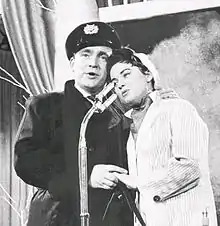
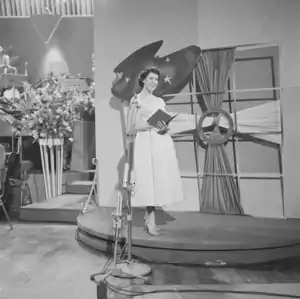 Raquel Rastenni in Hilversum (1958)
Raquel Rastenni in Hilversum (1958)
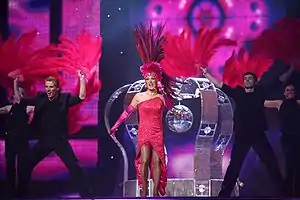
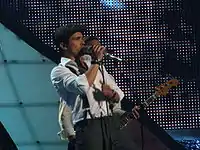

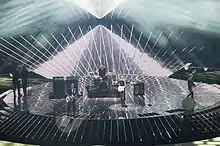
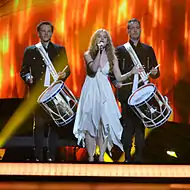

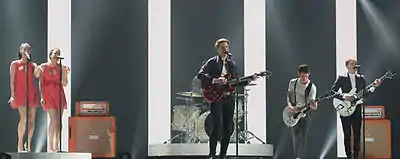


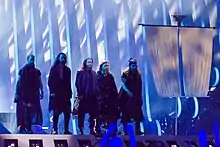

See also
- Dansk Melodi Grand Prix
- Dansk Melodi Grand Prix winners
- Denmark in the Eurovision Choir of the Year – A competition organised by the EBU for non-professional choirs.
- Denmark in the Eurovision Dance Contest – Dance version of the Eurovision Song Contest.
- Denmark in the Eurovision Young Dancers – A competition organised by the EBU for younger dancers aged between 16 and 21.
- Denmark in the Eurovision Young Musicians – A competition organised by the EBU for musicians aged 18 years and younger.
- Denmark in the Junior Eurovision Song Contest – Junior version of the Eurovision Song Contest.
- Faroe Islands in the Eurovision Song Contest
- Greenland in the Eurovision Song Contest
Notes
- In 1996 Denmark failed to qualify for the contest. There was an audio only pre-qualification round for all countries (excluding hosts Norway). The official Eurovision site does not count 1996 in Denmark's list of appearances.
- According to the then-Eurovision rules, the top ten non-Big Four countries from the previous year along with the Big Four automatically qualified for the grand final without having to compete in semi-finals. For example, if Germany and France placed inside the top ten, the 11th and 12th spots were advanced to next year's grand final along with all countries ranked in the top ten.
- If a country had won the previous year, they did not have to compete in the semi-finals the following year.
- Also contains phrases in German and Danish.
- The 2020 contest was cancelled due to the COVID-19 pandemic.
- All conductors are of Danish nationality unless otherwise noted.
- Also conducted the Portuguese entry.
- Host conductor
- Krogsgård conducted the first half of the Danish entry. Part of the way through, as part of the staging, he was beckoned by Birthe Kjær to join her on stage, at which point he left the podium to sing with her backing group while Kaufman conducted the rest of the song.
- Conducted by Henrik Krogsgârd at the national final.
- Musical director of the national final; presumably would've conducted the Danish entry at Eurovision had they made it past the pre-qualification round.
- Although there was no orchestra at the international final, there was one present for the Danish selection show, conducted by Ken Børjesen.
References
- Siim, Jarmo (2 September 2013): "Copenhagen announced as host city of Eurovision 2014". Eurovision.tv. Retrieved 2 September 2013.
- Cobb, Ryan (21 April 2017). "Analysing ten years of OGAE voting: "Underneath the fan favourite bias is a worthwhile indicator"". escxtra.com. Retrieved 8 December 2019.
- Roxburgh, Gordon (2012). Songs for Europe: The United Kingdom at the Eurovision Song Contest. Volume One: The 1950s and 1960s. Prestatyn: Telos Publishing. pp. 93–101. ISBN 978-1-84583-065-6.
- Roxburgh, Gordon (2014). Songs for Europe: The United Kingdom at the Eurovision Song Contest. Volume Two: The 1970s. Prestatyn: Telos Publishing. pp. 142–168. ISBN 978-1-84583-093-9.
- Roxburgh, Gordon (2016). Songs for Europe: The United Kingdom at the Eurovision Song Contest. Volume Three: The 1980s. Prestatyn: Telos Publishing. ISBN 978-1-84583-118-9.
- "THE VOTING RESULTS OF THE 2ND SEASON OF DEPI EVRATESIL". eurovision.am. 26 February 2018. Retrieved 11 December 2019.
- "Jørgen de Mylius". Filmography. Internet Movie Database. Retrieved 15 July 2013.
- Eurovision Song Contest 1991. Internet Movie Database. Retrieved 27 July 2013.
- "Hans Otto Bisgaard". Filmography. Internet Movie Database. Retrieved 15 July 2013.
- "Keld Heick". Filmography. Internet Movie Database. Retrieved 15 July 2013.